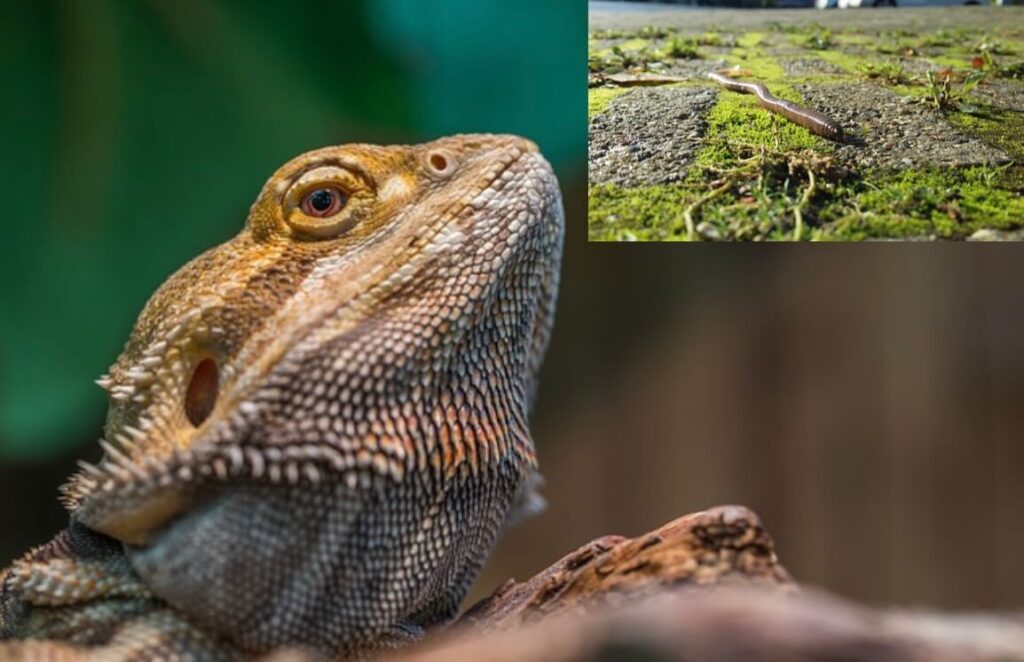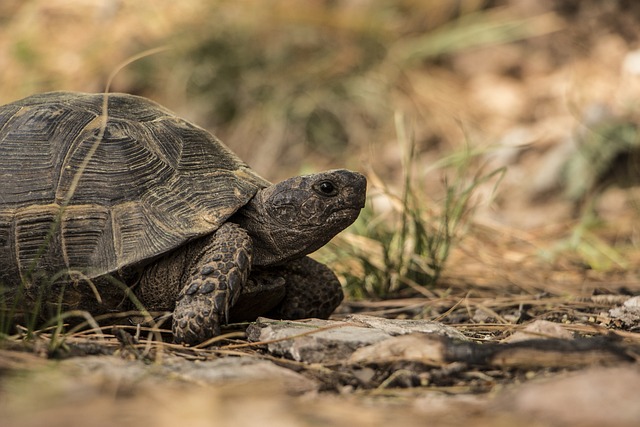If you’re wondering “Can bearded dragons eat earthworms?” the answer is yes! In fact, bearded dragons can eat earthworms a few times a week, and they make for a great nutritious snack.
In this article, we’ll explore the nutritional value of earthworms for bearded dragons and how to feed them properly. As well, see our full guide on feeding beardies worms here – Can bearded dragons eat worms?
Can bearded dragons eat earthworms?
- Can bearded dragons eat earthworms?
- Earthworm Nutritional Value for Bearded Dragons:
- How often should you give earthworms to your beardie?
- Should I feed my baby bearded dragon earthworm?
- Cons associated with feeding earthworms to your bearded dragon:
- What to do if your bearded dragon eats pesticide covered earthworms accidentally?
- Frequently Asked Questions (FAQ): Can bearded dragons eat earthworms?
- Foods bearded dragons can eat:
- Getting your bearded dragon calcium:
- Vegetables to feed your bearded dragon:
- Insects to feed your bearded dragon:
- How often should you feed a bearded dragon?
- What should a bearded dragon not eat?
- Recap: Can bearded dragons have earthworms?
Earthworm Nutritional Value for Bearded Dragons:
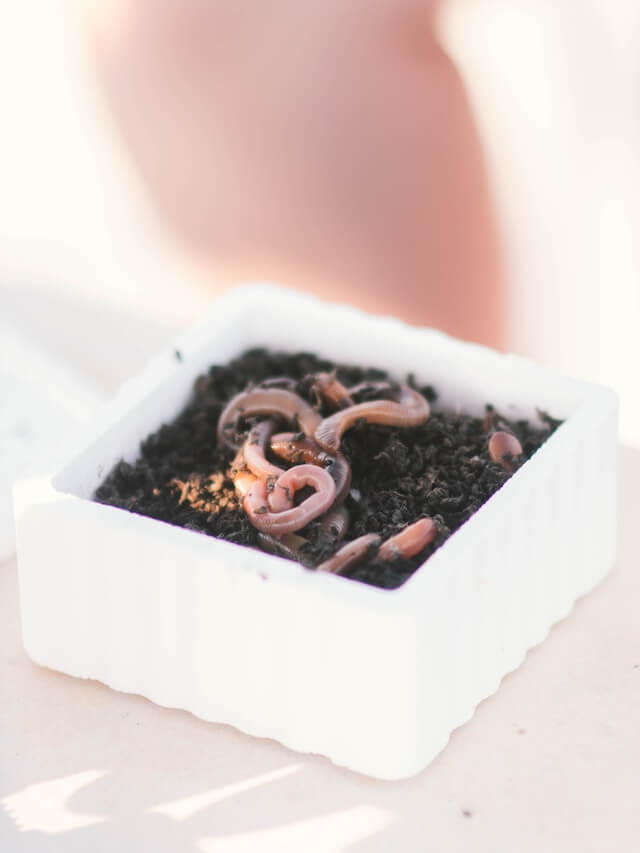
Earthworms, sometimes called “rainworm”, “nightcrawler”, “dew-worm”, or “angleworm” are a huge class or worms found in soil all around the globe. Many people find them outside after it rains and wonder if they can feed one to their beardie. Luckily, earthworms are known to contain large amounts of protein, which your pet needs to grow and sustain their bone health. They also contain high levels of vitamins, iron, and importantly – calcium. Calcium is the most vital nutrient for a bearded dragon’s health.
How often should you give earthworms to your beardie?
You can safely feed your bearded dragon earthworms every two or three days. It’s best to feed them a few earthworms at a time, so drop in three to five earthworms at once and see if they finish them all. If they do, you can drop in a few more until they’re full.
Earthworms shouldn’t be fed to your bearded dragon daily as they can be high in fat and some subtypes have a lot of phosphorus, which can inhibit proper calcium absorption in bearded dragons. To counteract this, you should dust the earthworms you feed your bearded dragon with calcium powder.
Should I feed my baby bearded dragon earthworm?
Yes! It’s great for baby bearded dragons to eat earthworms as they’re full of protein. Baby bearded dragons need lots of protein and calcium to properly grow into adulthood.
Cons associated with feeding earthworms to your bearded dragon:
If you give your bearded dragon an earthworm you find outside, there’s always a chance it’s covered in insecticide or pesticide. When your dragon ingests this pesticide, it could poison them and cause them serious harm and distress. That’s why store bought or home raised worms are safest. The earthworm from outside could also be harboring a dangerous parasite that could hurt your dragon.
One way to counteract this is to only buy earthworms from a pet store or from a reputable source. Some people keep a mulch bin, which is soil that they put organic material in, like egg shells and bananas. You can drop some earthworms into your mulch bin, as they will help break down the soil and organic material, creating lovely healthy soil for you that you can use in your garden. An added benefit is that the worms will mate and you will have an earthworm source in your mulch bin that you can safely feed to your bearded dragon.
What to do if your bearded dragon eats pesticide covered earthworms accidentally?
Don’t panic. Immediately stop your bearded dragon from eating the worms, and closely monitor them closely for symptoms of a strong reaction. This reaction could include:
- Bloating
- Diarrhea
- Vomiting
- Spitting up
- Abnormal behaviors
Give them lots of water to flush out the chemicals as well as a warm bath to calm them down and to encourage a bowel movement. If the reaction worsens or you’re noticing anything out of the ordinary, call a vet immediately.
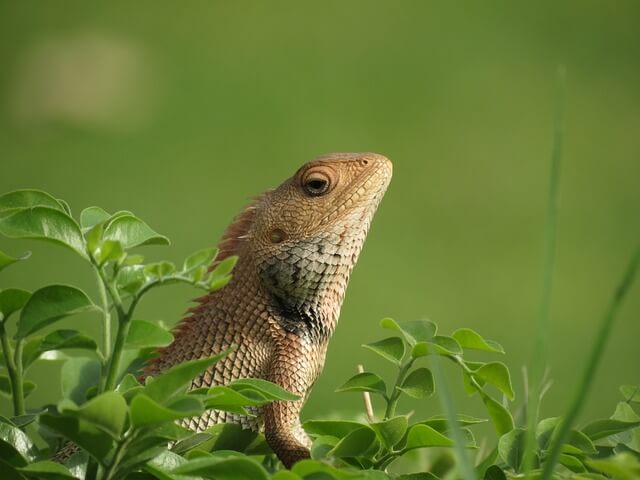
Frequently Asked Questions (FAQ): Can bearded dragons eat earthworms?
Are earthworms good for reptiles?
Yes, earthworms provide protein, vitamins, fat, and moisture for reptiles. Many reptiles in the wild regularly eat earthworms for nutrition and sustenance.
How old do bearded dragons have to be to eat worms?
Many baby bearded dragons can safely eat worms (from as young as a few weeks old). However, if you do feed baby bearded dragon worms, try to feed them smaller and softer worms like small earthworms or silk worms. There are larger worms with hard exoskeletons that might pose a choking hazard and impact their small developing stomachs.
Can bearded dragons eat worms everyday?
Technically, yes, bearded dragons can eat worms everyday but they should only eat them every few days at most. Many worms are high in fat and this could lead to weight gain and obesity. As well, if you put worms in their terrarium everyday, your dragon will eat them instead of the vegetables. Try to alternate days so that they eat all their veggies.
Can bearded dragons eat grass?
While bearded dragons can eat grass, they shouldn’t eat too much of it. See our article on bearded dragons eating grass for more details.
Can bearded dragons eat nightcrawlers?
A nightcrawler is just a type of earthworm. It is the largest naturally occurring species of earthworm found in many parts of Europe. So yes, bearded dragons can safely eat nightcrawlers, so long as they don’t have pesticides on them or contain parasites.
Can bearded dragons eat red worms?
Bearded dragons can eat red worms because they’re high in protein and relatively low in fat for a worm.
Can bearded dragons eat rolly pollies?
Bearded dragons can safely eat rolly pollies as they have a lot of protein and calcium, which are great for beardies. However, their shells have a high level of chitin, which can be hard for bearded dragons to digest in large quantities.
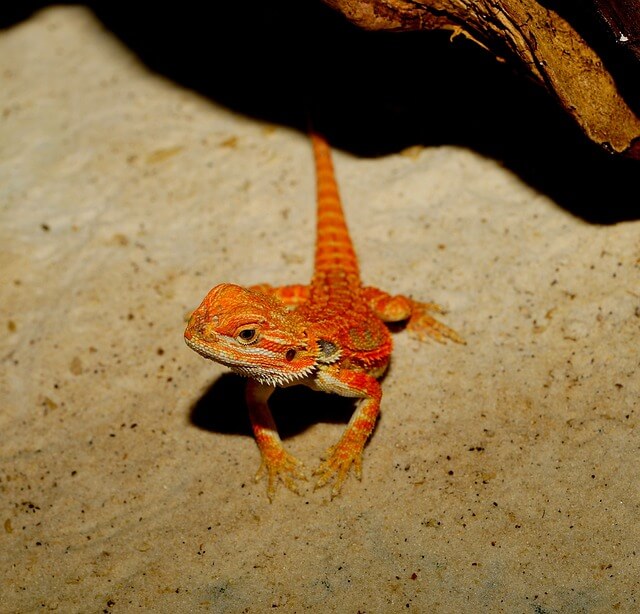
Foods bearded dragons can eat:
If you’re wondering what you should feed a bearded dragon, read our guidelines below. Bearded dragons are insectivores, which just means they thrive on insects as well as plant materials.
If you have a juvenile bearded dragon (between six and eighteen months old), give them about 80% vegetables and 20% live insects.
As your bearded dragon transitions into adulthood, give them the inverse, so 20% plant materials and 80% insects.
Getting your bearded dragon calcium:
Calcium is especially vital to a bearded dragon, especially a young one that is still growing. There are several ways to introduce more calcium into your beardie’s diet:
- Add in more high calcium vegetables like dandelions, bok choy, and collard greens.
- Dust calcium powder over their insects and vegetables to increase calcium levels.
- Make sure they’re getting their 12 hours of UVB exposure as they need this light to be able to properly absorb nutrients.
Vegetables to feed your bearded dragon:
- Peas
- Dandelion
- Green beans
- Cabbage
- Zucchini
- Pumpkin
- See our full list of vegetables to feed your bearded dragon
Note: Bearded dragons can also eat fruit in moderation. See here for a complete list of fruits bearded dragons can eat.
Insects to feed your bearded dragon:
- Crickets
- Kingworms
- Waxworms
- See our full guides to insects you can feed your bearded dragon and worms to feed your bearded dragon
Quick note: Live insects raised by you or bought from the pet store are best because they’re definitely pesticide free.
How often should you feed a bearded dragon?
During the first 3-6 months of your beardie’s life, try to feed them four to five times a day by giving them as many insects as they’d like in 10 minutes. They’re growing and need lots of protein during this stage.
Reduce the number of feedings to about two to three times a day when they’re growing into their juvenile years (between six and eighteen months).
As they become an adult, you can feed them once daily.
What should a bearded dragon not eat?
Avoid feeding your bearded dragon:
- Onions
- Leeks
- Chives
- Mushrooms
- Garlic
- Acidic fruit like oranges, lemons
- Rhubarb (can be toxic to them)
- Avocados (surprisingly, these make them ill)
- Eggplant
- Insects caught in the wild (there may be pesticides covering them)
- Venomous insects
- Dairy of any kind
- Rice and grains of any kind
- Frogs or toads
- Ham or other processed meats
Recap: Can bearded dragons have earthworms?
- Yes, bearded dragons can eat earthworms. Baby and juvenile bearded dragons can eat them as well.
- Avoid feeding them earthworms you find outside, as they could be covered in pesticides or contain harmful parasites.
- Feed them earthworms from the pet store or that you raise yourself.
For our full list of food to feed a bearded dragon, see our guide here.
Related articles:

